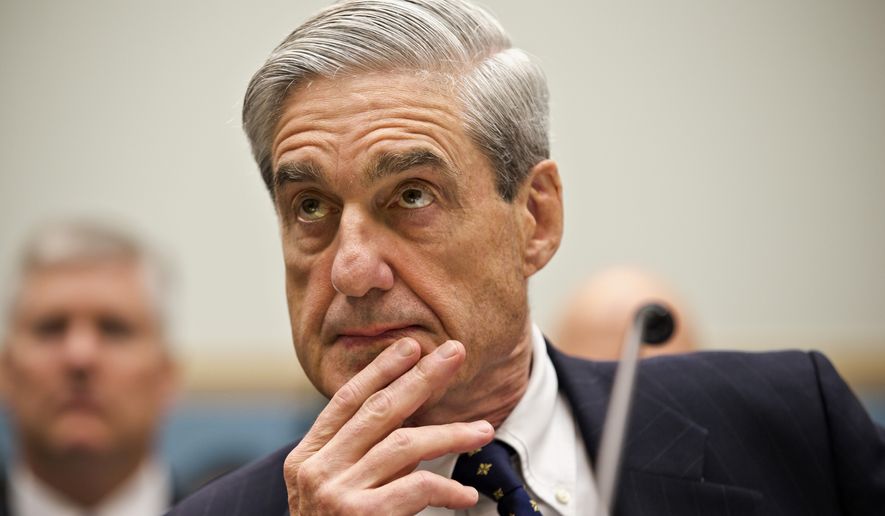Special counsel Robert Mueller on Friday indicted 12 Russian military officials, accusing them of massive attempts to interfere in the 2016 presidential election by emails from Hillary Clinton’s campaign chief and another political committee, and penetrating state elections computers.
Deputy Attorney General Rod Rosenstein announced the indictments at the Justice Department, just days before President Trump is to meet with Russian President Vladimir Putin for a one-on-one summit.
Mr. Rosenstein said he has briefed Mr. Trump on what investigators found, saying the attempts by Russian officials was an attack on American democracy.
“The blame for election interference belongs to the criminals who committed election interference. We need to work together to hold the perpetrators accountable, and keep moving forward to preserve our values, protect against future interference, and defend America,” Mr. Rosenstein said.
The White House released a defensive statement that didn’t acknowledge any of the charges or allegations and instead focused on what wasn’t in the indictment.
“Today’s charges include no allegations of knowing involvement by anyone on the campaign and no allegations that the alleged hacking affected the election result. This is consistent with what we have been saying all along,” said White House spokesperson Lindsay Walters.
SEE ALSO: Russian trolls shared legitimate local news through ‘sleeper’ Twitter accounts: Report
The indictment was handed up by a grand jury in Washington on Friday morning. Mr. Rosenstein said the timing was the result of “the collection of facts, evidence of law.”
Mr. Rosenstein said the hackers used spear phishing scams and malware to steal emails of Mr. Podesta and other campaign operatives, then injected it into the 2016 political campaign.
The operatives created two fictitious identities, a supposedly lone-wolf hacker Guccifer 2.0 and another supposed group of Americans dubbed DCLeaks, as cutouts to share the information.
And the operatives used an unnamed organization to spread the emails — apparently WikiLeaks, which published the Podesta emails in the late stages of the 2016 campaign, spawning thousands of stories.
Mr. Podesta told CNN Friday afternoon the indictment was an “important step.”
“At the heart of [the indictment] is criminal activity by the Russian government,” he said.
SEE ALSO: Mueller team pressing Roger Stone associates in Russian collusion probe: Report
Americans were in contact with the operatives, Mr. Rosenstein said, but the indictment doesn’t allege any of them knew they were communicating with Russians attempting to influence the election.
But Mr. Podesta said he was skeptical that Americans were unaware they were communicating with Russians, citing U.S. intelligence reports linking Gufficer 2.0 and DCLinks to that country’s operatives.
“If anyone did not than that was willful ignorance on their part,” he said.
Rudolph W. Giuliani, a member of President Trump’s legal team, praised the indictments as “good news” for Americans.
“The indictments Rod Rosenstein announced are good news for all Americans. The Russians are nailed. No Americans are involved,” he tweeted. “Time for Mueller to end this pursuit of the President and say President Trump is completely innocent.”
Mr. Rosenstein said they are not alleging that any votes were changed by the Russian operatives.
The indictment includes counts of unauthorized computer access, identity theft and money laundering, as well as an additional charge of conspiracy to access computers. That latter charge stems from the attempts to break into state elections officials’ systems.
Russian military intelligence officers did hack the website of one state board of elections and stole information about 500,000 voters; hacked a voter registration software company’s systems; and tried to plant malware on elections administration officials, the government charges.
In the campaign attack, the military officers created a fake email account with a similar name as a top Clinton campaign member, according to the indictment. They used that account to launch a spearfishing attack, giving them access to the email accounts of more than 30 campaign officials.
The 29-page indictment is a painstaking index of how the 12 Russians, who are all members of GRU Units 26165 and 74455, allegedly went to great lengths to hack the Clinton campaign and DNC. It details the steps the conspirators took to identify computers, steal documents without detection and cover their tracks.
By conducting transactions using bitcoin, a virtual currency, the conspirators were able to avoid directly dealing with banks who require personal information, thus enabling them to evade law enforcement. The Russians purchased a server and the DCLeaks domain name with bitcoin, according to the indictment.
“The conspirators acquired bitcoin through a variety of means designed to obscure the origin of the funds,” the indictment said.
The Russians targeted a domain hosted by provider used by Ms. Clinton’s personal office and 76 email addresses at the Clinton campaign on or about July 27, 2016, according to the indictment. On the same day, Mr. Trump jokingly urged the Russians to “find the 30,000 emails that are missing.”
Using the online persona of Guccifer 2.0, the conspirators tried to reach Trump campaign staff in August 2016, according to the indictment. The defendants wrote to an unidentified person who was in regular contact with senior members of the Trump campaign and asked how they could help.
The indictment does not allege that the Russians ever made contact with the Trump campaign staff.
Current DNC Chairman Tom Perez said the indictments contradict Mr. Trump’s claim that the Mueller investigation is a witch hunt and hoax.
“The Kremlin’s efforts to disrupt our electoral process have grave implications for our democracy,” Mr. Perez said. “Donald Trump and his Republican enablers’ efforts to discredit these established facts only embolden Putin’s Russia and invite further attacks on our country.”
• Jeff Mordock can be reached at jmordock@washingtontimes.com.




Please read our comment policy before commenting.